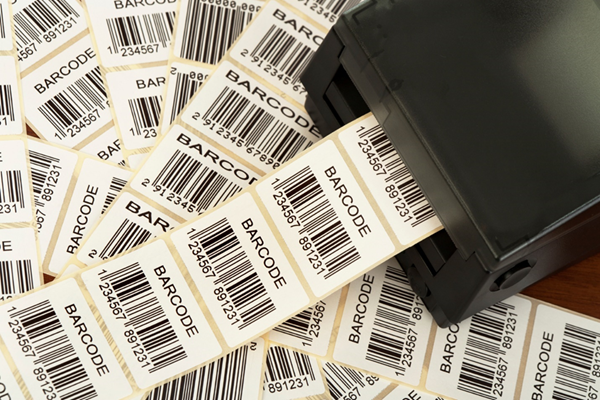Please select your location & language for the best website experience

Nobody wakes up in the morning wanting to have a difficult day, so why should your company want to wake up to a difficult labeling process? Having an easy labeling process is a goal for companies of all sizes because it not only reduces headaches, but also leads to fewer errors and less confusion when training new employees.
If your company has the goal of streamlining your labeling process, TEKLYNX has something for you: three labeling best practices to make labeling easier. These best practices, along with other strategies to help your company label better, can also be found in TEKLYNX Best Practices for Barcode Labeling eBook.
Download Best Practices for Barcode Labeling eBook
The first best practice for creating an easy labeling process across your organization revolves around where your labels are stored.

Like trying to find your car in the jam-packed stadium parking lot after the game, finding the right label on your computer can be time consuming and frustrating. If your label storage location is unorganized or overflowing with individual label files, there's an easy way to make your labeling process easier. Simply store all your label files in one centralized location. To accomplish this, your company could choose to utilize network licensing, which updates label files on a centralized server rather than on individual machines. Your company could also implement a central repository, which prevents storing label files on separate machines, as well as disparate files and updates.
With TEKLYNX barcode label design products, label files (LABELVIEW (.lbl) or CODESOFT (.lab)) can be stored in cloud locations such as Google Drive or Microsoft OneDrive. Data sources stored in cloud locations such as Google Sheets, Microsoft Excel Online or OData can be leveraged for use on a label file. Download a free 30 day trial and learn how to print labels with cloud data from Google Sheets, Excel Online, and OData connections.
In addition, leveraging label templates cuts down on the number of files in the file storage location. Label templates allow for fewer individual files and are considered “smart labels” because they connect with a database that fill in variable information. The benefits from centralizing your label storage range from saving time and money to reducing errors to standardizing processes; each benefit creates ease in the labeling process.
Centralizing your label file storage can reduce the time it takes to find the right label, but best practice number two focuses on the design and printing aspect to further maximize the benefits from implementing best practice number one.
Using the same brand and version of barcode labeling software guarantees that your labels can be successfully opened, viewed, edited, and printed by everyone involved in the labeling process. A piece of advice that goes along with this best practice - if a file is saved in a newer version of LABELVIEW software, it is not backwards compatible and cannot be opened in an older version of LABELVIEW. It can be frustrating when a team member with an older version of software is trying to open the label file saved in the newer version, but by standardizing your company's barcode labeling software to the same brand and version, this problem can be avoided completely. If you’re interested in learning more about standardizing your labeling programs, let's chat.
Your company's labels are now centralized, your company's label software is now standardized, and your company’s goal to make labeling easier is almost realized! The last best practice focuses on integrating your company's business system into the labeling process for greater printing ease.
Your company's already existing business or Enterprise Resource Planning (ERP) system houses critical business data that often needs to be printed on your labels. So why not integrate your label software with it? Integration with a business or ERP system makes printing easy, minimizes errors, and provides the fastest label printing speeds because you print directly out of your business of ERP system. Printing can be triggered by scanning a barcode, adding a record to a database, or using a scale to weigh a product. No matter which way printing is triggered, automated printing is guaranteed to make the labeling process easier. Print automation software can be leveraged for a smooth integration.
Flex-Strut saw a 100% increase in label printing speed from reducing labeling bottlenecks with CODESOFT and SENTINEL and fulfilled requirements such as:
Read the full case study to learn more.
Having an easy labeling process not only benefits your company by decreasing errors and time, but it also benefits your employees by reducing their grievances with the process. Rest assured, by following the best practices of centralizing your label storage location, standardizing your barcode label software, and printing from your business system, your company can wake up to an easy labeling process.
Let TEKLYNX assess your current labeling process for improvements, so your labeling environment is efficient and easy to use.
Nick Recht is the Sales Manager for the Americas region at TEKLYNX RFID and barcode label solution provider. He leverages his passion for using technology to add value to businesses and his 15 years of AIDC experience to help organizations of all sizes barcode better. When he is not working, he is driving one of his daughters to a practice of some sort or doing a project around the house.
As our world moves towards a digital transformation, automation is a crucial tool for a thriving business. By automating processes, companies can make their workflows faster and more efficient, enabling them to do more with less. This blog will go over how to automate your label printing and how TEKLYNX can help in providing solutions.
READ MORE
Imagine painting a room and gathering supplies. You wouldn’t want to stop at three separate stores for your paint, primer, and brushes. It’s more convenient and efficient to stop at a store that carries everything you need, right?
READ MORE
You wouldn’t wait years to go to the doctor for a check–up.
READ MOREI understand that the Enterprise versions are not compatible, if saved in a newer version the previous version cannot open it, however what about previous versions of reader only? is the 15 and 18 versions of the readers compatible with the 21 enterprise? thank you
Reply© Copyright 2025 TEKLYNX CORPORATION SAS. All Rights Reserved.
What do you think? Leave us a comment.
Comments will be reviewed and are subject to TEKLYNX’ comment policy. Your email address will not be published publicly.